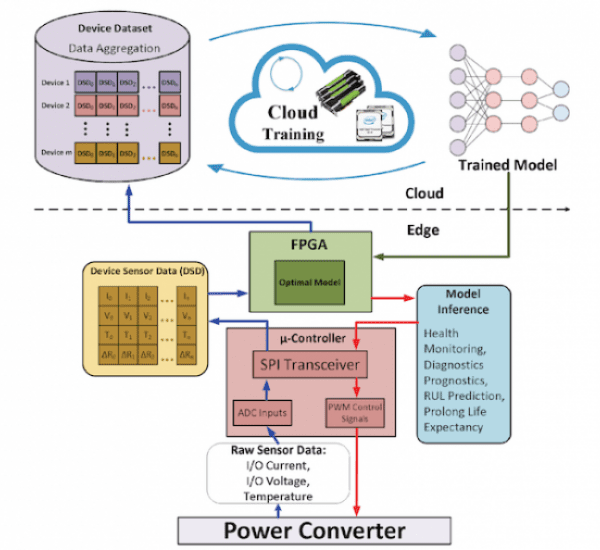Intelligent Power Electronics

Intelligent Power Electronics
Electrical and Computer Engineering
ECE faculty are developing specialized intelligent DC-AC and DC-DC power converters using embedded microcontrollers and edge computing. Dr. Babak Parkhideh, Associate Professor of ECE and Faculty Associate of the Energy Production and Infrastructure Center (EPIC) at UNC Charlotte, recently launched a project that focuses on developing and validating a DC-AC power electronic inverter as an essential subsystem of a new grid management architecture noted as Intelligent Power Stages (IPS). The IPS includes features such as subsystem interoperability, embedded intelligence, advanced EMI mitigation, as well as embedded and supervisory controls supporting multiple applications. The IPS can be divided into major subsystems which include a SUPER system controller, system protection, a DC-AC three-phase inverter with embedded localized control, isolated DC-DC power conditioner, and robust communications supporting subsystems interoperability and system level communication interface. Dr. Parkhideh has received a $200K grant from the DOE Oak Ridge National Laboratories to support his research.
Dr. Parkhideh, in collaboration with Dr. Tabkhi, is also developing a transformative solution called Deep learning Reliability Awareness of Converters at the Edge (Deep RACE) for real-time modeling and assessment of GaN power modules embedded into a wide range of smart power electronics systems. Deep RACE makes departures from classical learning and statistical modeling to deep learning-based data analytics, combined with full system integration for scalable real-time reliability modeling and assessment. The proposed research will create a real-time model of proposed deep learning algorithms. The proposed method leverages the Long Short-Term Memory (LSTM) networks as a branch of Recurrent Neural Networks (RNN) to aggregate reliability across many power converters with similar underlying physics. This research identifies the Pareto-curve of the multi-dimensional trade-off between data sampling rate, computation overhead, DL model size, prediction window and accuracy with respect to real-time requirements. Equally important, to monitor the system behavior, for the first time, we propose to conduct necessary research to develop a non-invasive sensing scheme that 1) can be integrated into power modules and 2) measures the current mismatch among parallel devices. If the latter is successfully demonstrated, the number of required sensors is reduced significantly to assess the gradual degradation of the power module. This research is sponsored by a grant from the DOD DA Army Research Laboratory (ARL).
EPIC at UNC Charlotte has demonstrated capabilities in the development and evaluation of advanced power systems. This experience includes the development of advanced power electronics, such as high-power density grid-tied three-phase inverters. The development team is led by professional engineering faculty and research staff. Detailed technical design execution is conducted by a multi-disciplinary team of experienced research engineers and graduate research assistants.